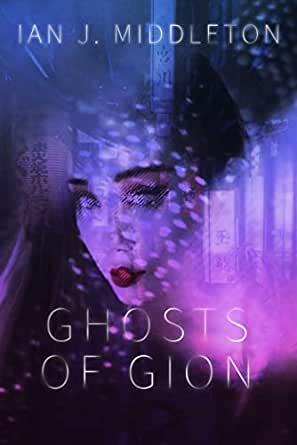You are here
Home › Books › Ian J. Middleton's novel 'Ghosts Of Gion' Is Evocative And Harrowing Sci-Fi ›Ian J. Middleton's novel 'Ghosts Of Gion' Is Evocative And Harrowing Sci-Fi
FTC Statement: Reviewers are frequently provided by the publisher/production company with a copy of the material being reviewed.The opinions published are solely those of the respective reviewers and may not reflect the opinions of CriticalBlast.com or its management.
As an Amazon Associate, we earn from qualifying purchases. (This is a legal requirement, as apparently some sites advertise for Amazon for free. Yes, that's sarcasm.)

According to the A.I. Index, since the year 2000, the annual investment from venture capital firms into U.S. startups utilizing artificial intelligence systems has increased as much as six times, and statistics show that overall global investments in A.I. research and applications is set to reach $500 billion by 2024. A CBC Radio interview with Dr. David Levy even quoted the A.I. expert as predicting, "...in a few generations, we won't just be having sex with robots, we'll be marrying them."
Humankind's interest in artificially created human-like beings extends back to antiquity, the myths of golems brought to life by magical means, but the most recognizable representative of synthetic intelligence in our collective unconscious came only with the industrialized era of mass-production. The robot, first named a century ago in Karel Čapek's 1921 play, 'R.U.R.' (Rossum's Universal Robots), was a specific type of sentient automated doppelgänger further expanded upon in the works of science fiction godfathers Isaac Asimov and Philip K. Dick, and on the silver screen with films such as Westworld, Blade Runner (itself based on Dick's Do Androids Dream Of Electric Sheep?), the RoboCop series, and the never-ending Terminator franchise. But in the ultra high-tech post-modern 21st century zeitgeist, how close is too close for comfort when it comes to artificial intelligence? Where are ethical lines drawn? And what, in the end, separates humankind from the machines we create in our own image?
That's the heady philosophical ground trod by Welsh-born New Zealand author Ian J. Middleton in his latest sci-fi/horror thriller, Beware The Moon Publishing's Ghosts Of Gion. An expansion from an earlier story, 'Geisha', originally written for The Other Stories podcast and available in his short fiction collection Ominous: A Collection of Dark Tales, Gion is a novel that offers a chillingly reflective take on the possibilities and dangers of unrelenting and immoral technological innovation.
The book's premise is deceptively simple: Lilly Monroe is a young British woman who arrives in Kyoto's historic, tourist-pandering, geisha-centric Gion district searching for her missing rebellious, globe-trotting sister, Katrina. With scant information on her sibling's travels, Lilly's sole lead regarding Katrina's disappearance involves a visit to the headquarters of Sy-Tech, a world-renown manufacturer of more-human-than-human geisha androids created to be ideal companions and also the last place Katrina was seen alive. Lily swiftly learns, however, that not only does Sy-Tech have a more sinister intention for their automatons than mere pleasurebots, but that their company's moral compass is broken in ways she'd never imagined.
What makes Ghosts Of Gion so rich isn't the plot; the straight-forward storyline, and particularly the killer-robot-army-run-amok climax, directly channels the aforementioned Michael Crichton vehicle Westworld, and Sy-Tech's android geishas owe more than their fair share to the replicants of Blade Runner fame. Instead, Middleton wisely eschews the conventional world-building that oftentimes overpowers average science fiction stories to focus instead on Lilly herself. His lush, hypnotic prose and grounded characterization allows us deep access to her troubled psyche; in contrast to the rambunctious Katrina, Lilly is depicted as cripplingly introverted, a sometimes unconfident woman ill at ease with the world and her place in it and continually haunted by childhood fears. Tormented well into her adult years by the memory of her Aunt Mandy's creepy doll collection, Lilly has a distinct phobia of porcelain faces that consistently tests her mettle amid the geisha-crowded district. Yet as virtually the sole character of the book, Lilly's fragile personality shows its strength in a variety of ways; her stubbornness, resilience in the face of adversity and, most of all, an unfaltering loyalty to those closest to her.
Perhaps owing to its short story roots, Ghosts of Gion makes for quick entertainment; a dedicated reader could absorb the entire novel in a solitary day. But that dedication comes easily; Middleton's descriptions are so vivid, particularly when relaying the Gion district itself, that one is thoroughly immersed in its evocative rainy-day splendor. The mystery elements, too, are intriguingly handled, and Kristina's ultimate fate, while not entirely unforeseen, unfurl with unwavering literary precision. Those seeking some chaotic horror thrills won't be disappointed, either; the scenes of Sy-Tech's decent into slam-bang android anarchy in the novel's last third are harrowing, and Lilly's grisly skin-blistering, face-melting confrontation with the corporation's executive villain easily matches anything Hollywood's CGI factory can hurl at an audience.
Ghosts Of Gion isn't a work concerned with upending convention; its storytelling lineage can readily be traced back through to classics of decades past. More than anything Middleton's novel falls into the category of Good Tales Well Told, and is worth every bit the investment of time taken to explore its pages. Filled with believable characters, thoughtful musings on modern-day questions about artificial intelligence and a throw-you-off-balance final chapter, Ghosts Of Gion earns an enjoyable 4 (out of 5) on my Fang Scale. Extra-special praise must be granted to the Garth Design Company, who crafted this novel's breathtakingly beautiful cover. It captured both my eye and heart before reading a single word. This is how it's done, people. Take note.


